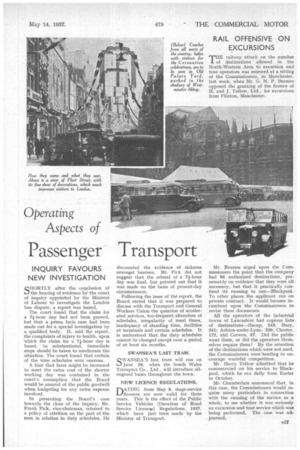Operating Aspects of
Page 47

If you've noticed an error in this article please click here to report it so we can fix it.
• Passenger Transport
INQUIRY FAVOURS NEW INVESTIGATION
SIIORTLY after the conclusion of the hearing of evidence by the court of inquiry appointed by the Minister of Labour to investigate the London bus dispute, a report was issued.
The court found that the claim for a 71-hour day had not been proved, but that a prima fade case had been made out for a special investigation by a qualified body. If, said the report, the complaints of injury to health, upon Which the claim for a 71-hour day is based, he substantiated; immediate steps should be taken to ameliorate the situation. The court found that certain of the time schedules were onerous.
A hint that fares might be increased to Meet the extra cost of the shorter working day was contained in the court's assumption that the Board would be assured of the public goodwill when budgeting for any extra expense involved.
In presenting the Board's case towards the close of the inquiry, Mr. Frank Pick, vice-chairman, referred to a policy of attrition on the part of the men in relation to duty schedules. He discounted the evidence of sickness amongst busmen. Mr. Pick did not suggest that the refusal of a 71-hour day was final, but pointed out that it was made on the basis of present-day circumstances.
Following the issue of the report, the Board stated that it was prepared to discuss with the Transport and General Workers Union the question of accelerated services, too-frequent alteration of schedules, irregularity of meal times, inadequacy of standing time, facilities at terminals and certain schedules. It is understood that, the duty schedules cannot be changed except over a period of at least six months.
SWANSEA'S LAST TRAM.
QWANSEA'S last tram will run on June 29, when the South Wales Transport Co., Ltd., will introduce oilengined buses throughout the town.
NEW LICENCE REGULATIONS.
DATING from May 8, stage-service licences are now valid for three years. This is the effect of the Public Service Vehicles (Duration of Road Service Licencf4s) Regulations, 1937, which have just been made by the Minister of Transport.
Mr. Beames urged upon the Commissioners the point that the company had 86 authorized destinations, presumably on evidence that they were all necessary, but that it practically confined its running to one—Blackpool. To other places the applicant ran oh private contract. It would become in cumbent upon the Commissioners to ,revise these documents.
All the operators of the industrial towns of Lancashire had copious lists of destinations—Bacup, 243; Bury, 241; Ashton-under-Lyne, 239; Chester, 172, and Corwen, 57. Did the public want them, or did the operators themselves require them? By the retention of the destinations which were not used, the Commissioners were'tending to encourage wasteful competition.
Mr. Harry Tetlow admitted that he concentrated on his service to' Blackpool, which he ran daily from Easter to October.
Mr. Chamberlain announced that, in this case, the Commissioners would require many particulars in connection with the running of the service as a whole, to see whether it was seriously an excursion and tour service which was being performed. The case was adjourned.




















































































